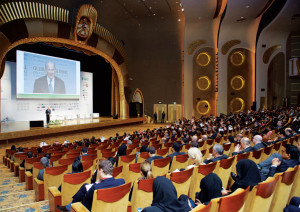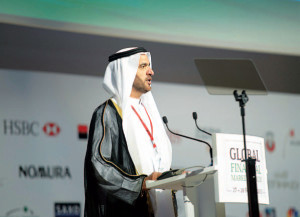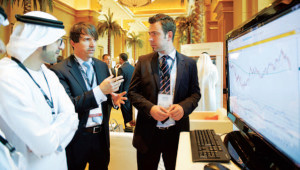 The 2013 Global Financial Markets Forum (GFMF), the fifth annual event of its kind, continued with its reputation as the region’s unrivalled platform for discussing and debating the globe’s most pressing and critical issues
The 2013 Global Financial Markets Forum (GFMF), the fifth annual event of its kind, continued with its reputation as the region’s unrivalled platform for discussing and debating the globe’s most pressing and critical issues
Keynote speakers such as H.E. Sheikh Nahyan Mubarak Al Nahyan, the UAE Minister of Higher Education and Scientific Research; and H.E. Sultan Bin Nasser Al Suwaidi, the Governor of the Central Bank of the UAE, were complemented by Nicolas Sarkozy, the former French President; James A. Baker III, former US Secretary of Treasury and State; David Miliband, former UK Foreign Secretary; and several key executives from UAE companies.

2013 GFMF
While most of this year’s speakers struggled to answer what the future held for Europe, everyone was in agreement about the UAE.
“We have an open and fast-growing economy, one that encourages competitiveness, innovation and balances preserving our heritage in this global world,” said H.E. Sheikh Nahyan Mubarak Al Nahyan. He added, “The UAE’s growth is creating opportunities for all.”
Michael Tomalin, the Group Chief Executive of National Bank of Abu Dhabi (NBAD), said “Abu Dhabi’s plans to diversify its economy offer substantial opportunities to investors. Abu Dhabi is an enormous opportunity for all. It is a city that is open to investors.”
Bonds market
The 2013 GFMF provided a medium to discuss the necessity of growing the domestic capital debt market to meet and realise the growth ambitions of the country.
H.E. Sultan Bin Nasser Al Suwaidi, the Governor of the Central Bank of the UAE, keynote address was entitled: The benefits of establishing a local debt market in the UAE.
“A domestic bond market would empower UAE companies to raise funds domestically and rely less on international markets,” he said.

speaks at 2013 GFMF
He added that as Basel II and III required higher reserves, it would be critical to grow the domestic bond and sukuk markets to empower UAE banks to raise money by issuing debt notes.
Michael Tomalin explained that the further development of a domestic bond market was critical to support Abu Dhabi’s growth plans “as balance sheets alone can’t support the ambitious plans of the emirate”.
Data shows the capital market is vigorous and growing. In 2013, the GCC debt capital market should score another positive year as fundamentals favouring the market are expected to continue.
“2012 was a stellar year for capital debt markets and we expect a continued growth and maturing of this sector that will fuel accelerated growth across the economy,” said Sameh Al Qubaisi, General Manager of the Corporate Coverage Group at National Bank of Abu Dhabi’s Global Financial Markets.
The GCC’s capital markets reached a record year as issuance reached nearly $42bn (AED 154bn) in 2012, up from $27bn in 2011.The GCC’s attractiveness for investors, relatively low interest rates and investors’ robust liquidity helped the market achieve a record year. It is expected that the amount would be around the same figure this year.

“The region experienced an increased direct capital inflow as investors shifted to investment in GCC paper,” said Fawaz Abusneineh, the head of Debt Capital Markets at NBAD. “GCC notes also offer a premium over similarly rated European and North American issues and this has helped attract fixed income investors to this region.”
During 2012, nearly half of all GCC capital market debt was issued by UAE entities. The National Bank of Abu Dhabi’s Debt Capital Markets Group increased the number of transactions executed by around five times during the year.
Of the total 51 issues last year, 25 were bonds and sukuk issued by UAE companies, 11 in Saudi Arabia, nine in Qatar, and three each in Bahrain and Kuwait.
“The UAE is crucial to the development of this market and we will see it becoming the centre of the debt market of the region,” said Sameh Qubaisi.
Global economy
The second day of the GFMF discussed the global economy. James A. Baker III, former US Secretary of Treasury and State, said, “The world economy is recovering from the global recession,” before he discussed the politics of his home country.
He said the United States is growing again, however, at a slow rate. “At the current growth rate, it will take (the US) years to achieve full employment.”
He called America’s debt “unsustainable” and added that US political parties must agree on a “grand bargain” on taxes and spending cuts. Economic and political “dysfunction” had prevented “achieving that grand bargain”, he added
Noting that Europe has deeper economic difficulties than the US, he said, “Emerging economies are the bright spots.”
Continuous success
The two-day 2013 Global Financial Markets Forum drew nearly 1,300 attendees, marking a record number for the fifth year in a row. Last year, it attracted more than 800 attendees.
“This annual forum continues to provide a very effective and dynamic medium to discuss, analyse and debate the most critical financial issues of our times,” said H.E. Nasser Ahmed Alsowaidi, the Chairman of the Abu Dhabi Department of Economic Development and Chairman of NBAD.
“We achieve these goals by inviting investors, policymakers and thinkers from around the globe to come and share with us their outlook on global financial markets and their outlook on their economies.”
Other speakers at 2013 GFMF included Lawrence McDonald, author of A Colossal Failure of Common Sense: The Inside Story of the Collapse of Lehman Brothers, who discussed the bond bubble; and David McWilliams, economist, broadcaster and author, who spoke about the European Outlook.
Panelists at the conference included several CEOs of leading companies and banks who discussed the impact of global challenges on UAE entities, and how UAE-based companies are positioning themselves in the global context.
They included H.E. Dr Nasser Saif Al Mansoori, CEO of Etihad Rail, Abdulla Al Mazrui, Chairman, Al Mazroui Holdings and TNI, Simon Cooper, CEO of HSBC Middle East, Tony Douglas, CEO Abu Dhabi Ports Company, and Carl Sheldon, CEO of TAQA.
Mahmood Al Aradi, the Senior General Manager of Global Financial Markets at NBAD, said GFMF served investors and thinkers of the region and beyond.
“Every year we built on our success and we are pleased that we continue to raise the bar year after year. We continue to bring the most prestigious thinkers and provide a comprehensive and effective platform for investors and policy-makers to understand the direction of the global economy.
“Certainly the annual Global Financial Markets Forum, which was launched in 2009, has established itself as an authority platform for discussions and debate on the current and future directions of the global economy as impacted by market factors as well as policies and potentials.”
Sameh Abdulla Al Qubaisi added, “In addition to delivering great value to attendees, GFMF continues to raise Abu Dhabi’s standing and promote it as a global hub and an attractive destination.”
Speakers at previous GFMF conferences included Paul Volcker, former chairman of the US Federal Reserve System; Axel Weber, president of Deutsche Bundesbank, the German Central Bank, and a member of the ECB Governing Council, and currently chairman of the board of UBS; and Nassim Taleb, the author of Swan.
 Cash And Trade Magazine For Cash and Trade professionals in the Middle East
Cash And Trade Magazine For Cash and Trade professionals in the Middle East




